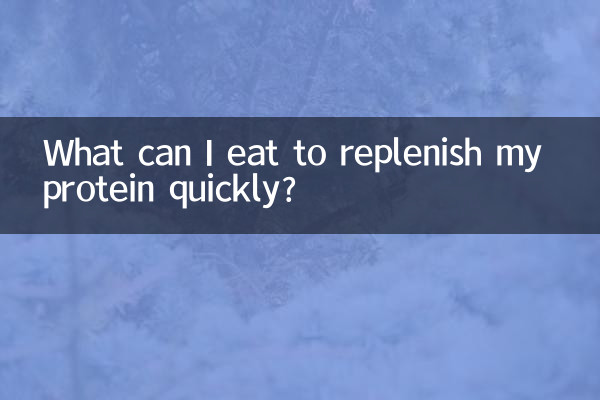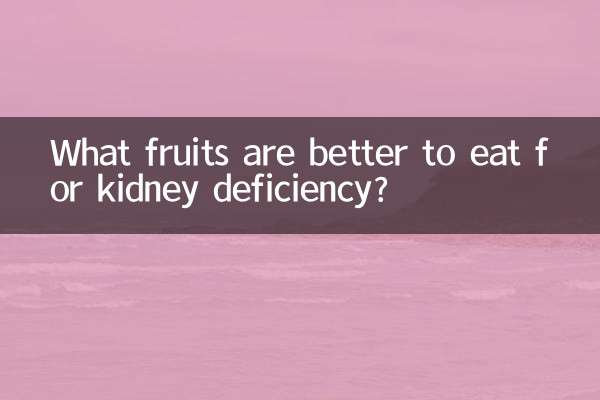What can I eat to replenish my protein quickly?
Protein is one of the essential nutrients for the human body and plays an important role in maintaining good health, enhancing immunity, and repairing tissues. Insufficient protein intake may lead to fatigue, reduced immunity, muscle loss and other problems. So, what can you eat to replenish your protein quickly? This article will combine the hot topics and hot content on the Internet in the past 10 days to provide you with scientific and practical suggestions.
1. The Importance of Protein

Protein is the basic substance that constitutes human cells, tissues and organs and participates in a variety of physiological functions, including:
1.Muscle Growth and Repair: Protein is the main building block of muscle and is essential for post-exercise recovery and muscle growth.
2.immune system support: Antibodies are made of protein, and adequate protein intake helps enhance immunity.
3.Production of hormones and enzymes: Many hormones and enzymes are proteins that regulate metabolism and other physiological processes.
4.energy supply: Protein can be used as a source of energy when carbohydrates and fats are insufficient.
2. Reasons for low protein
Insufficient protein intake may be caused by:
1.Unbalanced diet: Long-term vegetarian diet or lack of high-protein foods in the diet.
2.Digestion and absorption problems: Gastrointestinal disorders may cause protein malabsorption.
3.special physiological state: Pregnant women, lactating women, athletes, etc. have increased demand for protein.
4.Recovery period from illness or surgery: The body needs more protein to repair tissues.
3. What can you eat to replenish your protein quickly?
The following are food recommendations for quickly replenishing protein, divided into two categories: animal and plant-based:
| food category | food name | Protein content (per 100g) | Features |
|---|---|---|---|
| animal protein | chicken breast | About 31 grams | Low fat, high protein, suitable for fitness people |
| eggs | About 13 grams | Contains high-quality protein and various nutrients | |
| salmon | about 20 grams | Rich in Omega-3 fatty acids, good for cardiovascular health | |
| plant protein | soybeans | About 36 grams | The King of Plant Proteins, Suitable for Vegetarians |
| Quinoa | About 14 grams | Contains all 9 essential amino acids | |
| Almonds | About 21 grams | Rich in healthy fats and protein |
4. Dietary suggestions for quick protein replenishment
1.Balanced mix: Combine animal and plant proteins to improve absorption and utilization.
2.Eat small meals often: Intake protein in multiple portions to avoid overdose at one time.
3.cooking method: Choose healthy cooking methods such as steaming, boiling, and roasting to reduce nutrient loss.
4.Pair with carbs: Moderate amount of carbohydrates helps in the absorption and utilization of protein.
5. Precautions for protein supplementation
1.avoid overdose: Excessive protein may increase the burden on the kidneys. The recommended daily intake is body weight (kg) × 1.2-1.7 grams.
2.individual differences: Adjust protein intake according to age, gender, activity level, etc.
3.Special groups: Patients with kidney disease and liver disease need to control protein intake under the guidance of a doctor.
4.Replenishment time: Supplement protein within 30 minutes after exercise to help muscle repair.
6. Symptoms and responses to low protein
If you have the following symptoms, it may be a sign of protein deficiency:
| Symptoms | Possible reasons | Countermeasures |
|---|---|---|
| Fatigue | Insufficient energy supply | Increase protein and caloric intake |
| muscle loss | Protein breakdown is greater than synthesis | Strengthen resistance training and supplement protein |
| Decreased immunity | Insufficient antibody synthesis | Supplement high-quality protein to ensure sleep |
| Edema | Decreased plasma protein | Seek medical examination and adjust your diet |
7. Summary
Protein is an important part of a healthy diet and can be quickly replenished by consuming high-protein foods when protein is low. Animal proteins such as chicken breast, eggs, and fish, and plant-based proteins such as soy, quinoa, and nuts are all good choices. At the same time, pay attention to a balanced diet, reasonable combination, and adjust the intake according to your own situation. If protein is low for a long time or is accompanied by severe symptoms, it is recommended to seek medical examination in time.

check the details

check the details